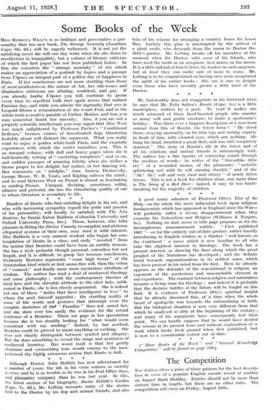Readers of Dante who find unfailing delight in his art,
and who with increasing sympathy regard the pride and passion of his personality, will hardly be satisfied with The New Beatrice, by Gratis Eaton Baldwin (Columbia University and Oxford University Press, 10s.). Those, however, who take pleasure in fitting the Divine Comedy to complete and abstruse allegorical systems of their own, may read it with interest. Miss Baldwin is a very earnest student who began her con- templation of Dante in a class, and early " recoiled " from the notion that Beatrice could have been an earthly woman. She has a style pedantic though personal, colourless but not limpid, and it is difficult to grasp her tenuous conclusions. Evidently Beatrice represents " some high forma" of the Aristotelian kind which at first seems free will, then the virtue of " counsel," and finally some more mysterious attribute of wisdom. The author has read a deal of mediaeval theology and some philosophy ; with the contemporary theories of ideal love and the chivalric attitude to the elect lady, subli- mated in Dante, she is less closely acquainted. She is indeed not one of those " ladies that have intelligence in love " to whom the poet himself appealed ; the startling reality of some of the words and gestures that interrupt even the seraphic doctrines of the " Paradise " does not arrest her, and she slurs over too easily the evidence for the actual existence of a Beatrice. There are gaps in her speculation because she is too steadily looking for " what would seem consistent with my reading." Indeed, by her method, Beatrice could be proved to mean anything or nothing. She does not clearly distinguish between symbol and allegory. But she does something to reveal the range and acuteness of mediaeval learning. Her worst fault is that her gently obstinate and sermonizing tone would convey to the inex- perienced the highly erroneous notion that Dante is dull.
* * * *




























 Previous page
Previous page